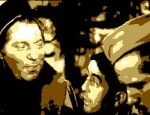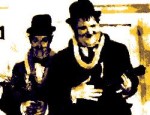Film Review

This is the film which made Jack Lemmon a star. Whilst Monroe and Curtis were established and well-known actors, Lemmon was comparatively unknown, although he had just had a big supporting role in Richard Quine's Bell Book and Candle (1958). Wilder and Lemmon got on well personally and professionally and would work together on a further six features, most famously The Appartment (1960).
Some Like It Hot benefits from a strong supporting cast which includes such talented performers as Pat O'Brien, Joe E. Brown, Joan Shawlee and George Raft. The latter began his career in tough gangster roles, such as the coin-tossing Rinaldo in Scarface (1932), so it is appropriate he should play the gangster boss in this film. Edward G. Robinson, another actor famous for gangster parts, is represented here by his son, who plays the assassin that emerges from the birthday cake to kill Spats Colombo and his gang in the film's hectic finale.
The director and cast may be of exceptional pedigree but perhaps the main reason for the success and longevity of Some Like It Hot is its faultless screenplay - written by Wilder and co-screenwriter I.A.L. Diamond. It is just a relentless barrage of side-splitting gags from start to finish. There are just so many jokes that it is impossible to catch every one in a single viewing. This is a film you can watch on five consecutive days and still find hilariously funny by day five.
Some Like It Hot may look like a near-perfect piece of cinema, but its production was nothing less than a chaotic ordeal for virtually everyone concerned. The cause of all this disruption was Marilyn Monroe, whose turbulent and increasingly painful private life was beginning to impact on her work. She had become so emotionally unstable and unreliable that Billy Wilder had to arrange shooting around his leading lady's unpredictable availability. Filming was frequently held up when Monroe failed to turn up on time or refused to leave her dressing room. Even when she was on set, the actress had difficulty remembering her lines and would often explode into foul-mouthed tantrums at the least provocation. The only member of the cast she warmed to was Jack Lemmon; she was unpopular with virtually everyone else on the set and did not get on well with Tony Curtis. The latter has been quoted as saying that his love scenes with Monroe were like being kissed by Hitler - the actor denied he ever said this in an interview with film historian Leonard Maltin in 2001.
Despite all these upsets and difficulties, Marilyn Monroe gives a stunning performance, combining glamour, raw sensuality and adolescent naivety in the way that only she could. She plays her part with charm, pathos and surprising realism, whilst handling the comedy very adeptly. Best of all she gets to sing three show-stopping songs, which showcase her at her best: Running Wild, I'm Through With Love and I Just Wannna Be Loved By You, the latter being her most famous number.
After Monroe, the biggest selling point of Some Like It Hot is the remarkable Curtis-Lemmon double act, which attains an almost operatic level of hilarity in some scenes. What is particularly laudable is the way in which both actors carry themselves as female impersonators. It would have been so easy to reduce the cross-dressing routine to low campery, but what Curtis and Lemmon give us is something much funnier - two men who are trying desperately to pass themselves off as women in a frantic attempt to save their skins. The opportunities for high class comedy are seized by both actors and delivered with effortless ease. Another masterstroke was Curtis's idea to play the oil tycoon with an accent that is an obvious (and rather cruel) imitation of Cary Grant, thereby rendering every line he utters doubly funny.
That Some Like It Hot was one of Billy Wilder's biggest successes is self-evident. The film grossed eight million dollars in its initial American release alone. Critical reception was also favourable. It was nominated for six Oscar nominations - including Best Actor (Lemmon) and Best Director, but won only one award - for Best Costume Design (Orry-Kelly). It had more success at the Golden Globes in 1960, winning the Best Motion Picture Comedy award, and also awards for Jack Lemmon and Marilyn Monroe as Best Actor and Actess in a Comedy or Musical.
The film's most famous line is the final "Well, nobody's perfect" - Osgood's quip to Joe when the latter takes off his woman's wig and admits to being a man. This was a last minute addition to the script which was necessitated by Marilyn Monroe not being available on the last day of the shoot. A more perfect ending to Hollywood's best film comedy you could not imagine.
© James Travers 2008
The above content is owned by frenchfilms.org and must not be copied.
Film Synopsis
Chicago, 1929. Joe and Jerry are two unemployed musicians who are looking for work when they witness a gangland massacre. Realising that what they have seen puts their lives in danger, the two men hastily decide to leave town and contrive to get jobs with an all-girl jazz band that is on a train bound for Florida. The downside is that they have to pretend to be women - so Joe becomes Josephine and Jerry becomes Daphne. Both men fall for the band's singer, Sugar Kane, who dreams of marrying a millionaire. In Florida, Joe impersonates a rich businessman in an attempt to win his way into Sugar's affections. Meanwhile, Jerry, still disguised as Daphne, also attracts an admirer, in the form of Osgood, a real millionaire. Just as things are starting to hot up nicely for the two musicians, the Chicago mobsters turn up, with some unfinished business to conclude...© James Travers
The above content is owned by frenchfilms.org and must not be copied.
Similar Films
Here are some other films you may enjoy watching:- Les Aventures de Robert Macaire (1925)
- How to Steal a Million (1966)
- Young and Innocent (1937)
- La Fête à Henriette (1952)
- Coeurs joyeux (1932)
Other related links:
Film Credits
- Director: Billy Wilder
- Script: Billy Wilder, I.A.L. Diamond, Robert Thoeren (story), Michael Logan (story)
- Cinematographer: Charles Lang
- Music: Adolph Deutsch
- Cast: Marilyn Monroe (Sugar Kane Kowalczyk), Tony Curtis (Joe), Jack Lemmon (Jerry), George Raft (Spats Colombo), Pat O'Brien (Det. Mulligan), Joe E. Brown (Osgood Fielding III), Nehemiah Persoff (Little Bonaparte), Joan Shawlee (Sweet Sue), Billy Gray (Sig Poliakoff), George E. Stone (Toothpick Charlie), Dave Barry (Beinstock), Mike Mazurki (Spats' Henchman), Harry Wilson (Spats' Henchman), Beverly Wills (Dolores), Barbara Drew (Nellie), Edward G. Robinson Jr. (Johnny Paradise), Al Breneman (Bellhop), Ted Christy (Small Role), Marian Collier (Olga), Pat Comiskey (Spats' Henchman)
- Country: USA
- Language: English
- Support: Black and White
- Runtime: 120 min
The Golden Age of French cinema

The very best American film comedies

The very best period film dramas
